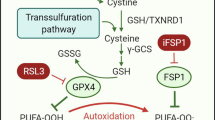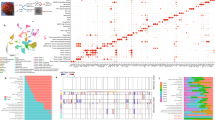Abstract
Most solid tumors are unable to grow in the ascites form, unless selected by prolonged serial transfer of peritoneal fluid (). Established ascites tumor cells grow under highly crowded, virtually anoxic conditions (). Hypoxia was recently identified as a powerful inducer of p53 dependent apoptosis (). We wished to examine whether the conversion of relatively well-vascularized solid mouse tumors into freely growing ascitic cell variants favors cell with mutated or deleted p53. We have sequenced exons 4–9 of p53 cDNA from two serially transplanted methylcholanthrene induced sarcomas (MCIM and MSWBS) that were available in the original solid and the gradually converted ascites form. We have also examined five additional solid tumors, four carcinomas and one sarcoma and six additional ascites tumors, five carcinomas and one sarcoma. Sequence analysis showed that all solid tumors carried exclusively wild type p53. Among the eight ascites tumors, five carried mutant p53 and three had only the wild type gene. In one of the two isogenic pairs, the original solid tumor line had only wild type, whereas the derived ascites line had only mutant p53. In the second pair, the solid tumor was wild type whereas the ascitic variant was heterozygous. The naturally occurring alternatively spliced p53 (p53as) mRNA was detected in all solid tumors, but not in five of the eight ascites tumors. Our findings indicate that conversion of solid into ascites tumors favors the selection of cell variants with mutated p53 and of cells that lack the alternatively spliced form of p53.
This is a preview of subscription content, access via your institution
Access options
Subscribe to this journal
Receive 50 print issues and online access
$259.00 per year
only $5.18 per issue
Buy this article
- Purchase on Springer Link
- Instant access to full article PDF
Prices may be subject to local taxes which are calculated during checkout
Similar content being viewed by others
Author information
Authors and Affiliations
Rights and permissions
About this article
Cite this article
Magnusson, K., Satalino, R., Qian, W. et al. Is conversion of solid into more anoxic ascites tumors associated with p53 inactivation?. Oncogene 17, 2333–2337 (1998). https://doi.org/10.1038/sj.onc.1202149
Received:
Revised:
Accepted:
Published:
Issue Date:
DOI: https://doi.org/10.1038/sj.onc.1202149
Keywords
This article is cited by
-
On reprogramming of tumor cells metabolism: detection of glycogen in the cell lines of hepatocellular origin with various degrees of dedifferentiation
Cytotechnology (2018)
-
HIF-1α contributes to tumour-selective killing by the sigma receptor antagonist rimcazole
Oncogene (2007)
-
Antiangiogenic effect of 2-benzoyl–phenoxy acetamide in EAT cell is mediated by HIF-1α and down regulation of VEGF of in-vivo
Investigational New Drugs (2006)
-
Array-based comparative gene expression analysis of tumor cells with increased apoptosis resistance after hypoxic selection
Oncogene (2005)
-
INK4a/Arf is required for suppression of EGFR/ΔEGFR(2-7)-dependent ERK activation in mouse astrocytes and glioma
Oncogene (2004)



